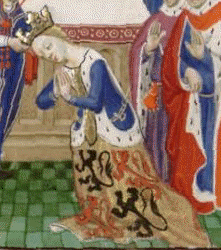A description of Philippa can be found the register of the Bishop of Exeter which reads:
"The lady whom we saw has not uncomely hair, betwixt blue-black and brown. Her head is clean-shaped; her forehead high and broad, and standing somewhat forward. Her face narrows between the eyes, and the lower part of her face is still more narrow and slender than her forehead. Her eyes are blackish-brown and deep. Her nose is fairly smooth and even, save that it is somewhat broad at the tip and also flattened, and yet it is no snub-nose. Her nostrils are also broad, her mouth fairly wide. Her lips somewhat full, and especially the lower lip. Her teeth which have fallen and grown again are white enough, but the rest are not so white. The lower teeth project a little beyond the upper, yet this is but little seen. Her ears and chin are comely enough. Her neck, shoulders, and all her body are well set and unmaimed; and nought is amiss so far as a man may see. Moreover, she is brown of skin all over, and much like her father; and in all things, she is pleasant enough, as it seems to us. And the damsel will be of the age of nine years on St. John's day next to come, as her mother saith. She is neither too tall nor too short for such an age; she is of fair carriage, and well taught in all that becometh her rank, and highly esteemed and well beloved of her father and mother and of all her meinie, in so far as we could inquire and learn the truth."
Phillipa and Edward were married for forty years, she gave Edward thirteen children, three of them of her children died as a result of the Black Death in 1348.
NB: Since writing this post I have read Ian Mortimer's book The Perfect King: The Life of Edward III, Father of the English Nation, in it he suggests that the above description is that of Philippa's sister Margaret.


 RSS Feed
RSS Feed
